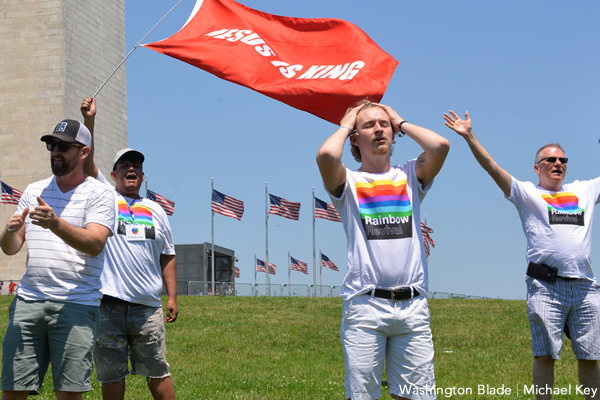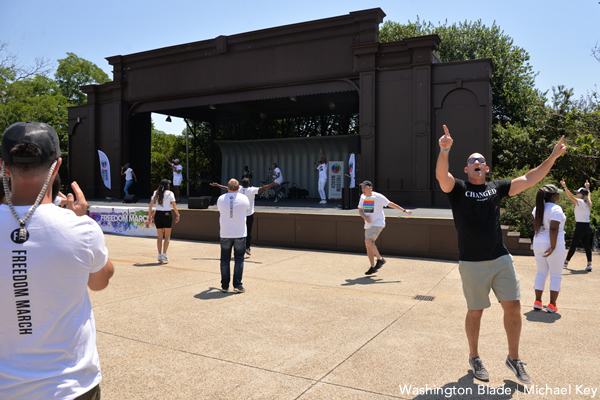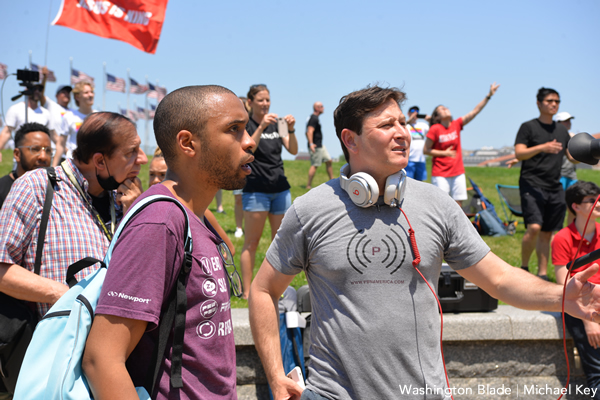Local
‘Ex gays’ hold rally on Washington Monument grounds
Speakers claim faith in Jesus helped them leave ‘LGBTQ identities’

About 200 people gathered at the outdoor Sylvan Theater on the grounds of the Washington Monument on June 5, for a rally and march to promote the debunked belief that people can change their sexual orientation from gay to straight through faith in Jesus Christ.
The event, which organizers called Freedom March, was led by an organization called CHANGED, which says on its website that it provides support for men and women who are sexually attracted to the same sex or who are “uncertain of their gender” who seek a transformation away from those characteristics.
More than a dozen people who self-identified as having changed their sexual orientation or gender identity spoke on the Sylvan Theater stage with a four-member band playing background music. A male vocalist sang religious hymns, creating an atmosphere of an Evangelical Christian church service.
“It is not about going from gay to straight,” said a man who identified himself as a minister named Joshua. “It is about going from lost to saved.”

Among the speakers were Ken Williams and Elizabeth Woning, who were identified as co-founders of CHANGED or the “Changed movement.”
“I’m a father of four and I’m a former LGBTQ identified person,” Williams told the gathering.
Like many of the speakers, Williams offered a prayer in which he said Jesus Christ saved him and many others by guiding them away from “temptations” leading them to same-sex attractions they do not want.
“I pray Father that you would wake up the people that are supposed to be crossing this path this afternoon,” he said. “I pray that those that are trapped, those that are sad, those that are depressed, those that don’t know you personally, that you would have them get up from whatever they’re doing and come through here this afternoon.”
Williams added, “Would you offer a brand-new life to every person who’s confused about their identity, who’s confused about their sexuality, who feels that there are labels placed upon them that they can’t remove but don’t want?”
Organizers announced plans upon the conclusion of the speakers to walk from the Sylvan Theater around the Washington Monument grounds to the Lincoln Memorial reflecting pool and back to the theater, where the event would end.
Among those attending the event as observers were Wayne Besen, executive director of the LGBTQ advocacy group Truth Wins Out, which since 2006 has waged public awareness campaigns opposing the “ex-gay” movement; and Jared Dixon, an official with Conversion Therapy Survivors, a group that provides support for people who have experienced what the group says were harmful effects of conversion therapy.
Dixon, who describes himself as a gay man in a fulfilling relationship with another gay man for the past nine years, said he entered conversion therapy back in 2011 as a 21-year-old college student at the urging of his parents, who raised him in a religious setting. He said the conversion therapy caused him to suffer depression that led to a suicide attempt.
He said he joined and became a member of the leadership team of Conversion Therapy Survivors, known as CT Survivors, after several years of therapy with LGBTQ supportive therapists who helped him fully accept himself “for who I am.”
Besen said he believes his group has been successful in debunking what he and other LGBTQ advocacy organizations have long pointed out – that attempts to change someone’s sexual orientation or gender identity through so-called conversion therapy or “reparative” therapy are strongly opposed as being harmful by all of the nation’s major medical and mental health professional associations, including the American Psychiatric Association and the American Medical Association.
Besen said widespread reports of how conversion therapy, including religious oriented “counseling” programs seeking to change people’s same-sex attractions have led to serious mental health problems, including suicide, led to the disbanding of several prominent “ex-gay” organizations, including Exodus International about five years ago.
But Besen said CHANGED, the group that organized the June 5 event on the Washington Monument grounds, reflects what he believes is an effort to revive the “ex-gay” movement through the use of sophisticated social media campaigns that he says will put many vulnerable people, especially young LGBTQ people, at risk.
“What we’re witnessing here is disturbing to me,” Besen said. “What we’re looking at is a slick rebranding and rebooting of the same toxic message,” he told the Washington Blade. “And they’re getting better at it.”
Besen noted that ex-gay organizers appear to have abandoned the “fire and brimstone” approach of denouncing homosexuality and LGBTQ people who don’t want to change and instead are expressing an outward “love” and “support” for LGBTQ people with the aim of leading them to become “free” from same-sex attractions if they choose to do so.
Many of the speakers at the June 5 Freedom March wore white T-shirts with a rainbow-colored design above the slogan, “Rainbow Revival.”
“So, we’re seeing a new and improved ex-gay industry right now,” Besen said. “And that’s why we’re upping our game too, in fighting them with our new campaigns.”
Besen was referring to Truth Win’s Out’s newly launched social media campaign to challenge what it calls a resurgent “ex-gay” industry.
“You can’t ‘pray away the gay’ and efforts to do so inevitably lead to denial, depression and despair,” Besen says in a statement released by his group. “Our videos will debunk the lies peddled by the Freedom March and other ‘ex-gay’ programs in an effort to educate and save lives,” he said.


In an official statement released at the reveal event Capital Pride Alliance described its just announced 2026 Pride theme of “Exist, Resist, Have the Audacity” as a “bold declaration affirming the presence, resilience, and courage of LGBTQ+ people around the world.”
The statement adds, “Grounded in the undeniable truth that our existence is not up for debate, this year’s theme calls on the community to live loudly and proudly, stand firm against injustice and erasure, and embody the collective strength that has always defined the LGBTQ+ community.”
In a reference to the impact of the hostile political climate, the statement says, “In a time when LGBTQ+ rights and history continue to face challenges, especially in our Nation’s Capital, where policy and public discourse shape the future of our country, together, we must ensure that our voices are visible, heard, and unapologetically centered.”
The statement also quotes Capital Pride Alliance CEO and President Ryan Bos’s message at the Reveal event: “This year’s theme is both a declaration and a demand,” Bos said. “Exist, Resist, Have Audacity! reflects the resilience of our community and our responsibility to protect the progress we’ve made. As we look toward our nation’s 250th anniversary, we affirm that LGBTQ+ people have always been and always will be part of the United States’s history, and we will continue shaping its future with strength and resolve,” he concluded.
District of Columbia
Capital Pride board member resigns, alleges failure to address ‘sexual misconduct’
In startling letter, Taylor Chandler says board’s inaction protected ‘sexual predator’

Taylor Lianne Chandler, a member of the Capital Pride Alliance Board of Directors since 2019 who most recently served as the board’s secretary, submitted a letter of resignation on Feb. 24 that alleges the board has failed to address instances of “sexual misconduct” within the Capital Pride organization.
The Washington Blade received a copy of Chandler’s resignation letter one day after she submitted it from an anonymous source. Chandler, who identifies as transgender and intersex, said in an interview that she did not send the letter to the Blade, but she suspected someone associated with Capital Pride, which organizes D.C.’s annual LGBTQ Pride events, “wants it out in the open.”
“It is with a heavy heart, but with absolute clarity, that I submit my resignation from the Capital Pride Alliance Board of Directors effective immediately,” Chandler states in her letter. “I have devoted nearly ten years of my life to this organization,” she wrote, pointing to her initial involvement as a volunteer and later as a producer of events as chair of the organization’s Transgender, Gender Non-Conforming, and Intersex Committee.
“Capital Pride once meant something profound to me – a space of safety, visibility, and community for people who have often been denied all three,” her letter continues. “That is no longer the organization I am part of today.”
“I, along with other board members, brought forward credible concerns regarding sexual misconduct – a pattern of behavior spanning years – to the attention of this board,” Chandler states in the letter. “What followed was not accountability. What followed was retaliation. Rather than addressing the substance of what was reported, officers and fellow board members chose to chastise those of us who came forward.”
The letter adds, “This board has made its priorities clear through its actions: protecting a sexual predator matters more than protecting the people who had the courage to come forward. … I have been targeted, bullied, and made to feel like an outsider for doing what any person of integrity would do – telling the truth.”
In response to a request from the Blade for comment, Anna Jinkerson, who serves as chair of the Capital Pride board, sent the Blade a statement praising Taylor Chandler’s efforts as a Capital Pride volunteer and board member but did not specifically address the issue of alleged sexual misconduct.
“We’re also aware that her resignation letter has been shared with the media and has listed concerns,” Jinkerson said in her statement. “When concerns are brought to CPA, we act quickly and appropriately to address them,” she said.
“As we continue to grow our organization, we’re proactively strengthening the policies and procedures that shape our systems, our infrastructure, and the support we provide to our team and partners,” Jinkerson said in her statement. “We’re doing this because the community’s experience with CPA must always be safe, affirming, empowering, and inclusive,” she added.
In an interview with the Blade, Chandler said she was not the target of the alleged sexual harassment.
She said a Capital Pride investigation identified one individual implicated in a “pattern” of sexual harassment related behavior over a period of time. But she said she was bound by a Non-Disclosure Agreement (NDA) that applies to all board members and she cannot disclose the name of the person implicated in alleged sexual misconduct or those who came forward to complain about it.
“It was one individual, but there was a pattern and a history,” Chandler said, noting that was the extent of what she can disclose.
“And I’ll say this,” she added. “In my opinion, with gay culture sometimes the touchy feely-ness that goes on seems to be like just part of the culture, not necessarily the same as a sexual assault or whatever. But at the same time, if someone does not want those advances and they’re saying no and trying to push you away and trying to avoid you, then it makes it that way regardless of the culture.”
When asked about when the allegations of sexual harassment first surfaced, Chandler said, “In the past year is when the allegation came forward from one individual. But in the course of this all happening, other individuals came forward and talked about instances – several which showed a pattern.”
Chandler’s resignation comes about five months after Capital Pride Alliance announced in a statement released in October 2025 that its then board president, Ashley Smith, resigned from his position on Oct. 18 after Capital Pride became aware of a “claim” regarding Smith. The statement said the group retained an independent firm to investigate the matter, but it released no further details since that time. Smith has declined to comment on the matter.
When asked by the Blade if the Smith resignation could be linked in some way to allegations of sexual misconduct, Chandler said, “I can’t make a comment one way or the other on that.”
Chandler’s resignation and allegations come after Capital Pride Alliance has been credited with playing the lead role in organizing the World Pride celebration hosted by D.C. in which dozens of LGBTQ-related Pride events were held from May through June of 2025.
The letter of resignation also came just days before Capital Pride Alliance’s annual “Reveal” event scheduled for Feb. 26 at the Hamilton Hotel in which the theme for D.C.’s June 2026 LGBTQ Pride events was to be announced along with other Pride plans.
District of Columbia
Capital Stonewall Democrats elect new leaders
LGBTQ political group set to celebrate 50th anniversary

Longtime Democratic Party activists Stevie McCarty and Brad Howard won election last week as president and vice president for administration for the Capital Stonewall Democrats, D.C.’s largest local LGBTQ political organization.
In a Feb. 24 announcement, the group said McCarty and Howard, both of whom are elected DC Advisory Neighborhood Commissioners, ran in a special Capital Stonewall Democrats election to fill the two leadership positions that became vacant when the officers they replaced resigned.
Outgoing President Howard Garrett, who McCarty has replaced, told the Washington Blade he resigned after taking on a new position as chair of the city’s Ward 1 Democratic Committee. The Capital Stonewall Democrats announcement didn’t say who Howard replaced as vice president for administration.
The group’s website shows its other officers include Elizabeth Mitchell as Vice President for Legislative and Political Affairs, and Monica Nemeth as Treasurer. The officer position of secretary is vacant, the website shows.
“As we look toward 2026, the stakes for D.C. and for LGBTQ+ communities have never been clearer,” the group’s statement announcing McCarty and Howard’s election says. “Our 50th anniversary celebration on March 20 and the launch of our D.C. LGBTQ+ Voter’s Guide mark the beginning of a major year for endorsements, organizing, and coalition building,” the statement says.
McCarty said among the organization’s major endeavors will be holding virtual endorsement forums where candidates running for D.C. mayor and the Council will appear and seek the group’s endorsement.
Founded in 1976 as the Gertrude Stein Democratic Club, the organization’s members voted in 2021 to change its name to Capital Stonewall Democrats. McCarty said the 50th anniversary celebration on March 20, in which D.C. Mayor Muriel Bowser and members of the D.C. Council are expected to attend, will be held at the PEPCO Gallery meeting center at 702 8th St., N.W.




















